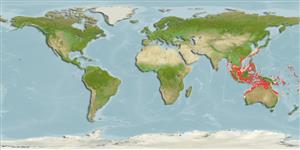Macrophiothrix hirsuta (Müller & Troschel, 1842)
| Native range | All suitable habitat | Point map | Year 2050 |

|
| This map was computer-generated and has not yet been reviewed. |
| Macrophiothrix hirsuta AquaMaps Data sources: GBIF OBIS |
Mandar um arquivo com seu (sua) Fotos
Imagem do Google |
No photo available for this species.No drawings available for Ophiodermatidae.
Imagem do Google |
No photo available for this species.
Classification / Names Common names | Synonyms | CoL | ITIS | WoRMS
Ophiuroidea | Ophiacanthida | Ophiodermatidae
Environment: milieu / climate zone / depth range / distribution range Ecologia
; intervalo de profundidade 0 - 90 m (Ref. 81020). Tropical
Distribuição Países | Áreas FAO | Ecossistemas | Ocorrências | Introduções
Indo-West Pacific: Iran, Saudi Arabia, Thailand.
Length at first maturity / Tamanho / Peso / Idade
Maturity: Lm ? range ? - ? cm
Life cycle and mating behavior Maturidade | Reprodução | Desova | Ovos | Fecundidade | Larvas
Members of the class Ophiuroidea are mostly gonochoric, others are protandric. Fertilization is external. Brooding is common, bursae is used as brood chambers where the embryos develop into juveniles and later crawl out from the bursal slits. Life cycle: Embryos hatch into free-swimming planktotrophic larvae and later metamorphose into tiny brittle stars which sink down the bottom where they grow into adult form.
Referência principal
Referências | Coordenador | Colaboradores
Putchakarn, S. and P. Sonchaeng. 2004. (Ref. 2534)
Status na Lista Vermelha da IUCN (Ref. 130435: Version 2024-1)
Status no CITES (Ref. 108899)
Not Evaluated
CMS (Ref. 116361)
Not Evaluated
Perigo para os humanos
Harmless
Uso pelos humanos
| FishSource |
Ferramentas
Mais informação
Trophic Ecology
Itens alimentares
Dieta
Consumo alimentar
Ração
Predadores
Dieta
Consumo alimentar
Ração
Predadores
Ecology
Population dynamics
Crescimento
Idade/Tamanho
Comprimento-peso
Comprimento-comprimento
Frequências de comprimento
Mass conversion
Recrutamento
Abundância
Idade/Tamanho
Comprimento-peso
Comprimento-comprimento
Frequências de comprimento
Mass conversion
Recrutamento
Abundância
Life cycle
Distribution
Human Related
Perfil para aquacultura
Stamps, Coins Misc.
Stamps, Coins Misc.
Outreach
References
Fontes da internet
BHL | BOLD Systems | CISTI | DiscoverLife | FAO(Publication : search) | Fishipedia | GenBank (genoma, nucleotídeo) | GloBI | Gomexsi | Google Books | Google Scholar | Google | PubMed | Árvore da vida | Wikipedia (Ir para, procura) | Registro zoológico
Estimates based on models
Preferred temperature
(Ref. 115969): 24.7 - 29.1, mean 28.2 (based on 1354 cells).


